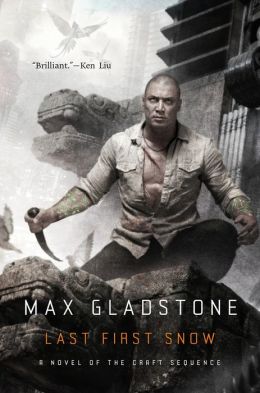Last First Snow is the fourth in Max Gladstone’s “Craft Sequence” novels. (In internal chronological order, it’s first: Gladstone has taken an unusual approach to numbering his novels. It’s not nearly as brain-bending as it sounds, because so far all the novels including this one stand alone perfectly well.) And it’s a great book.
It takes place some twenty years before Two Serpents Rise, and some four decades after the God Wars. In the city of Dresediel Lex, the King in Red and a consortium of investors have plans to redevelop an impoverished area of the city: the Skittersill, an area whose wards were laid down by gods, not practitioners of Craft. They are opposed in this by an alliance of locals and community leaders, of whom the most influential is Temoc: a former Eagle Knight and one of the last remaining priests of the old order, and a veteran of the God Wars who is now striving for a peaceful future for his people—including his wife and son. Before civic protest degenerates into civil unrest, Elayne Kevarian, associate in the Craft firm of Kelethras, Albrecht, and Ao—and retained by Dresediel Lex’s present powers-that-be to bring the Skittersill project to a workable conclusion—attempts to facilitate a negotiated solution to the stand-off between community and capital.
Elayne is old war buddies with powers and princes: she fought in the God Wars herself, and won something of a reputation. (Although Last First Snow is quite deliberate in its refusal to cast any of its principals as a war hero, past or present.) She knows Temoc of old. Their paths crossed on the battlefield, and again at the very end of the war. They respect each other, and more than that, Elayne’s sympathies are engaged by the people of the Skittersill.
(Warning: major spoilers for the plot are whited out below. Also note that the comments may contain additional spoilers.)
The parties are on the verge of accepting a negotiated settlement that doesn’t make anyone too unhappy when an assassination attempt touches off a riot: a cop kills a kid, and the crowd wants justice while the King in Red wants order. A peaceful protest turns into an armed stand-off, and open war breaks out on the city streets. Temoc cannot maintain his life as a man of peace. Elayne can only barely ameliorate the firestorm: she is constrained by her Craft, and her agreement with the King in Red.
And when poorly-armed protestors go up against power, poorly-armed protestors lose—badly.
This is a novel that takes mass protest and community organising and throws them into a universe where gods feed on human sacrifice and CEOs can deploy fiery death for crowd control: Elizabeth Bear has referred to it as “fantasy as a metaphor for the metastatic flower of late-stage capitalism” and there really is no better description. This is an intense book—Gladstone can make even meetings and negotiations nail-biting, to say nothing of chase scenes and battles and magical showdowns and emotional family confrontations—and one that is full of feeling.
Last First Snow is also an intensely political book: it is, after all, about community and civic politics, at least before everything turns to bloodshed. But its political arguments go more than skin deep. Its central concern is an argument between past and present, an age of gods and an age of commerce, between—if you like—”conservativism” and “progress.” One in which there are no right answers and certainly no easy answers. Just people, in all their humanity, complete with doubts and flawed certainties, shaped by history. Gladstone forces us to understand the King in Red, even as we despise him for his choices, and requires us to extend the same empathy to all of Last First Snow‘s characters, even the minor ones. They’re complicated, compelling, human, and very flawed—and at times, magnificent. Temoc’s relationship with his family, the way in which he is caught between the future he wants for them and the forces that shaped him into a priest and a warrior, is fraught and complex and understandable.
And Elayne Kevarian. Elayne is one of the delights of Gladstone’s oeuvre so far, playing important secondary roles in Three Parts Dead and Full Fathom Five. The childless older career woman, her skills sharp, her ruthlessness honed, makes frequent appearances in fiction and media. She’s almost always portrayed as a villain, or at least an antagonist. One of the many delightful things about Three Parts Dead was how Gladstone undermined this standard trope: Elayne has her own sense of ethics and her own agenda, and damn little tolerance for fools, but she’s not a villain. (In part this is because Gladstone doesn’t really run to either villains or heroes: his characters are more complicated than that.) In Last First Snow we see Elayne from her own perspective. She’s a fascinating character, and in her own way both admirable and honourable.
In his Craft sequence, Gladstone is writing a fantasy of modernity, deeply engaged with the issues of our time: the power of capital, the potential tyranny of corporations, the value of the individual, the tension between romanticised pasts and lived-in presents, and the aftermaths of conflict. Last First Snow epitomises his approach. It’s the kind of book that inclines me to use phrases like tour de force.
Max Gladstone just keeps getting better. It doesn’t quite seem fair. If you’re not reading his Craft sequence? Start.
Read Last First Snow. Seriously. Read it.
Last First Snow is available now from Tor Books.
Read the first chapter here on Tor.com, as well as a bonus excerpt.
Liz Bourke is a cranky person who reads books. Her blog. Her Twitter.










